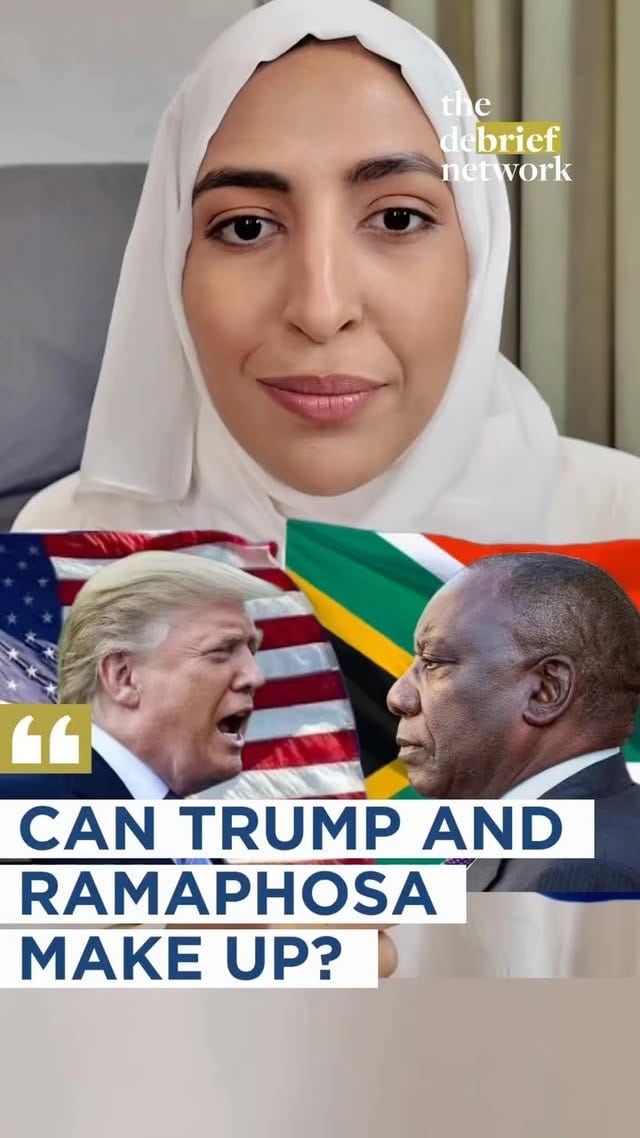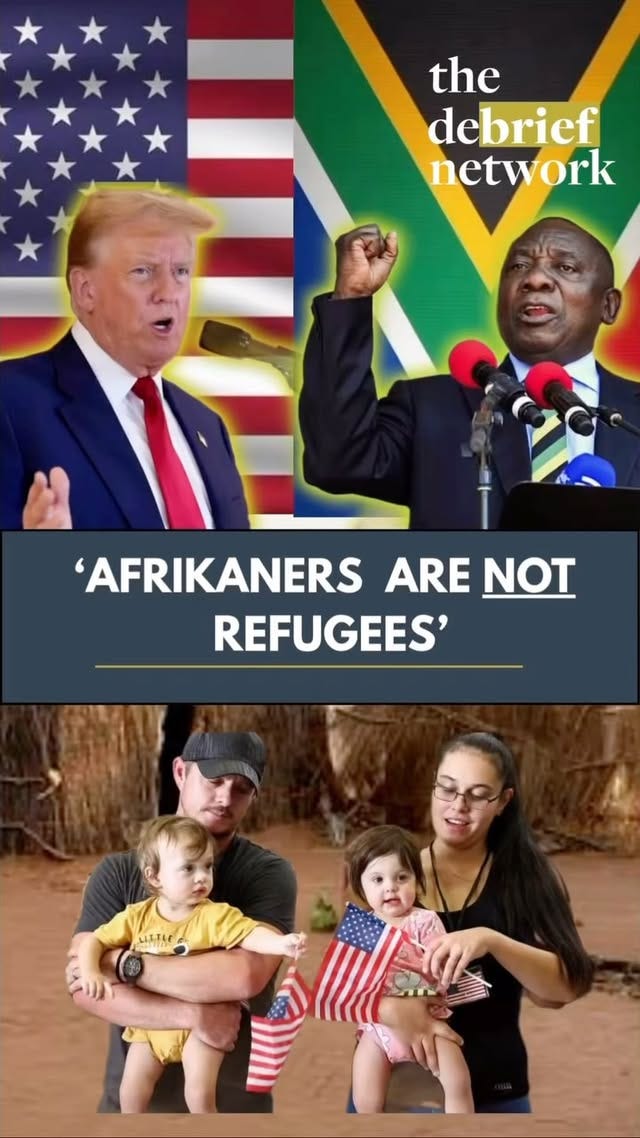The Great Tsek: South Africa, Trump and a twisted tale of 'racial persecution'
South Africans have an unmatched ability to laugh through the chaos. Give us political drama, a scandal, even a diplomatic mess — and we’ll turn it into a meme within minutes.
So, when news broke that 49 urbanised, millennial Afrikaners were applying for refugee status in the United States under Donald Trump’s so-called ‘White Genocide’ programme, South Africa did what it does best: laughed.
The jokes came in thick and fast. Some dubbed it The Great Tsek — a clever play on The Great Trek of the 1830s, when Afrikaners left the Cape Colony in search of independence.
The twist? “Tsek” is also our way of saying “get lost”. Only in South Africa can history, humour, and swearing come together so seamlessly.
But behind the laughter lies a far more serious issue.
Trump’s dangerous narrative
Trump insists there’s a genocide against white South Africans — despite having no evidence to back it up. This dangerous narrative isn’t just factually wrong, it undermines real persecution happening in the world. Ask the people of Darfur. Ask the Rohingya in Myanmar.
Now, President Cyril Ramaphosa is preparing to cross the Atlantic for a meeting with Trump — and a mission: convince him that white South Africans are not under attack. It should be simple. The facts are on Ramaphosa’s side. But with Trump, facts often don’t matter.
The New York Times reported that Trump’s claims started circulating years ago, and apparently was influenced by South African golfer Gary Player who had told him on the gold course that Afrikaners were driven from their land. There is no doubt that Elon Musk’s obsession about a non-existent white genocide pushed Trump to sign the Afrikaner Act executive order that allows the US to accept Afrikaners and other white South Africans to the US as refugees when its refugee program remains closed to all other groups.
In the wake of the 49 South Africans landing in the US, Trump has doubled down — insisting that they were victims of genocide and farm murders.
The myth of white persecution
Here’s what we actually know:
• There is no evidence to suggest white farmers are disproportionately targeted in rural killings. Most victims of rural crime are, in fact, Black South Africans.
• White South Africans continue to hold economic power. They make up just 8% of the population, yet hold 62.9% of top management roles.
• Only 4% of privately held land is owned by Black South Africans, who represent nearly 80% of the population.
• The unemployment rate for Black South Africans in late 2024 was 35.8%. For white South Africans? Just 6.7%.
So where is this perception persecution supposedly coming from?
I spent time speaking to Afrikaners, waiting to get called up in this programme. I listened with patience to their response as to why they feel like they are victims of racial persecution. All the responses sound the same: life is hell in South Africa because the government hates white people.
But when pushed for real examples, three pieces of legislation are typically cited:
1. The Expropriation Bill
Allows for land to be expropriated under specific conditions and in the public interest — with court oversight. It’s not unique to South Africa; the U.S. has eminent domain laws that do the same.
2. The BELA Bill
Misrepresented by groups like AfriForum, this bill governs administrative functions of public schools. It allows schools and government to jointly determine language policy — meaning Afrikaans-medium schools could become English if demographics support it. Hardly a cultural purge.
3. The Employment Equity Amendment Act
Updates a 1998 law that promotes workplace diversity. It aims to include more Black South Africans in the workforce. Critics scream “reverse apartheid”, yet white people still dominate the boardrooms.
Even broader redress laws — over 140 of them by Helen Zille’s count — are painted as persecution. In truth, they’re products of democratic processes aimed at transformation.
Let’s be honest: transformation in South Africa hasn’t exactly been a success story — but that’s a conversation for another day. The point here is that none of these laws amount to persecution.
Former Public Protector Thuli Madonsela said it best: Afrikaners are not used to being 'ordinary’ in South Africa. Essentially, when you are used to privilege, equality feels like opression.
What About Malema?
When all else fails in building the case of white victimhood, these purveyors of this fake white genocide narrative point to Julius Malema singing “Kill the Boer”. It’s become a 15-year-old political flashpoint but has meant nothing. Courts- including the Constitutional Court- have repeatedly ruled that it doesn’t constitute incitement to violence. Still, it remains a go-to scapegoat. It is it stupid of him to keep singing the song? Yes. But is it a threat to kill? No!
The narrative’s power lies in perception — amplified by figures like Musk, who has his own issues with South Africa.
For him its personal. His Starlink business can’t operate here without a Black empowerment partner.
So we can get why he might be peeved but it doesn’t justify how unrelenting he has been in pushing the narrative that white people are under threat in South Africa.
The Executive Order
There’s a difference between people having a misguided opinion about South Africa to there been an act of a foreign government that seeks to punish another state for something that is not even true.
So, what does Trump’s Executive Order actually say?
It claims South African policies dismantle equal opportunity and incite violence against white landowners. There is no credible evidence to support this. None.
But the real sting lies in another paragraph:
“South Africa has taken aggressive positions towards the United States and its allies, including accusing Israel, not Hamas, of genocide… and reinvigorating relations with Iran…”
Now we’re getting to the heart of the matter.
This isn’t about 49 Afrikaners missing their vleis and boerewors. It’s geopolitics.
Trump wants two things from Ramaphosa:
1. Scrap transformation laws.
2. Withdraw South Africa’s genocide case against Israel at the ICJ.
Ramaphosa can’t agree to either — not because he’s a moral hero, but because it would be illegal for him to do so.
How can Ramaphosa play this?
When Ramaphosa touches down in Washington and enters into the White House, what are his options?
1. Play the business angle
Ramaphosa has tasked Trade and Investments Minister Parks Tau to put together investment sweeteners for U.S. companies. Trump, after all, responds to business wins. Just ask the Middle East — where billion-dollar deals secured diplomatic smiles.
2. Leverage Ukraine
Ramaphosa was one of the few leaders with the ear of both Zelensky and Putin. Trump loves a dealmaker. He might respect that.
3. Keep it vague, appeal to reason
Ramaphosa is a skilled diplomat. He might not win Trump over, but he can make a case — or at least avoid escalation.
What he mustn’t do is appear defensive. Trump pounces on weakness. Just ask Zelensky.
What’s really at stake?
This visit isn’t about a few dozen would-be refugees. It’s about South Africa’s standing with the United States, its economic prospects, and how it defends its sovereignty under the pressure of a Trump presidency.
The laughter may continue at home. But make no mistake: the stakes are high.






